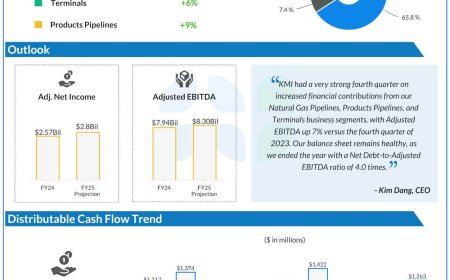Why Authenticity Matters in Modern Leadership?
Authenticity has emerged as one of the very strong principles of successful leadership in today’s highly connected and constantly changing world. In today’s fast-changing organizational environment, it is now more indispensable for a leader to be honest, transparent, and have a true sense of values to build trust, establish cooperation, and achieve sustainable success. Authentic […] The post Why Authenticity Matters in Modern Leadership? appeared first on Insights Success.

Authenticity has emerged as one of the very strong principles of successful leadership in today’s highly connected and constantly changing world. In today’s fast-changing organizational environment, it is now more indispensable for a leader to be honest, transparent, and have a true sense of values to build trust, establish cooperation, and achieve sustainable success. Authentic leadership does not only manage but also brings out meaningful connections and inspires others through honesty, moral integrity, and ethical strength.
The Groundwork of Trust
Authenticity in leadership starts with trust. Employees and stakeholders would like to associate with leaders who emit an image of consistency in what they say and do. Trust is important not only at the individual level but it is also the basis for any organization’s culture. With an authentic leader, one sets up a setting that gives people safety in being able to give their thoughts, take risks, and make mistakes.
Trust also brings about commitment. As researchers say, employees who believe in their leaders tend to be devoted to the organization and lead to a high productivity rate and decreased turnover. Authenticity in this respect keeps one’s credibility and regains the public’s trust overnight from scandals and corporate ethics breaches.
Emotional Connection and Empathy
It cannot only be the kind of technical knowledge in controlling a group; it involves emotional intelligence and connecting, emotionally speaking, with a team member. Authentic leadership truly feels for the comfort of the team members by empathetically listening to and caring for their issues at heart.
Empathy fosters teamwork because they can understand and appreciate each other. Leaders who acknowledge and validate the emotions of their workers tend to have a better relationship, which may make people work harder. This is important in diverse workplaces because cultural and personal differences could affect communication and teamwork.
Resilience in Unpredictable Times
Authenticity is even more valuable during times of crisis and uncertainty. As things get tough, authentic leaders communicate openly about what’s going on, about what’s difficult and about potential risks. This opens employees’ and stakeholders’ minds to the situation at hand, providing stability and a way forward.
Authentic leaders inspire resilience by being courageous and adaptable. They can face problems honestly and accept responsibility for their decisions, which inspires others to do the same. This promotes a culture of accountability and collective problem-solving, very essential in solving complex issues.
Innovation and Creativity
Authentic leadership allows an environment that fosters innovation and creativity. It makes room for employees, allowing them to come up with new ideas by giving time for feedback and diverse inputs. This helps improve problem solving but also helps in propelling organizational growth and competition.
Authenticity also fosters psychological safety, where members are free to speak without any fear of judgment or worse, retaliation. This is the safety needed to build a culture of experimentation and learning, which is central to innovation.
Vulnerability
Vulnerability is the definition of authentic leadership. While traditional models touted authority and control, it is the modern leader that is embracing vulnerability as a strength.
What authentic leaders possess is humility and approachability as they accept their imperfections. Accepting imperfections makes a leader accessible to people and brings a more human side to their being, where vulnerability could be tolerated. Thus, employees are likely to feel that the same struggles faced by the leadership in daily operation exist with them, thereby cultivating shared purpose.
Long-term Impact on Organizational Success
Authentic leaders lead an organization that stands a likelihood to succeed in the long-term. Authenticity forges a good organizational culture where people feel important enough to motivate them toward a better effort. In contrast, it not only invites great talent but further tightens retention of employees through significant reduction of costs by bringing down the turnover as well as disengagement cases.
Authentic leadership also promotes good relations with customers. Customers now look for companies that can show integrity and align practice with values articulated. With authentic leadership, leaders assure their followers that they are up to par with these standards.
Obstacles of Authentic Leadership
Although authentic leadership has all the advantages, it is not without its challenges. The most obvious is the tension between being authentic and pleasing different stakeholders’ expectations. It demands self-awareness, which is a capacity for navigating complex emotions, quite a task in high-pressure environments.
To succeed in such a challenging environment, leaders need to invest in personal growth by actively seeking time to reflect and learn. Feedback should be actively sought to align actions with intent and improve.
Authenticity is far from a buzzword but actually forms one of those transformative qualities which shape effective leaders in the current era. Authentic leaders thrive by creating trusting, empathetic, and resilient environments that inspire people toward success.
With continued and unprecedented challenges in organizations, the need for authentic leadership will continue to rise. Organizations with leaders who love themselves, communicate openly, and act with integrity can drive organizational success but have a long-term impact on the people and communities that they serve. In simple terms, authenticity becomes the base of leadership which transcends management and inspires change.
The post Why Authenticity Matters in Modern Leadership? appeared first on Insights Success.











































